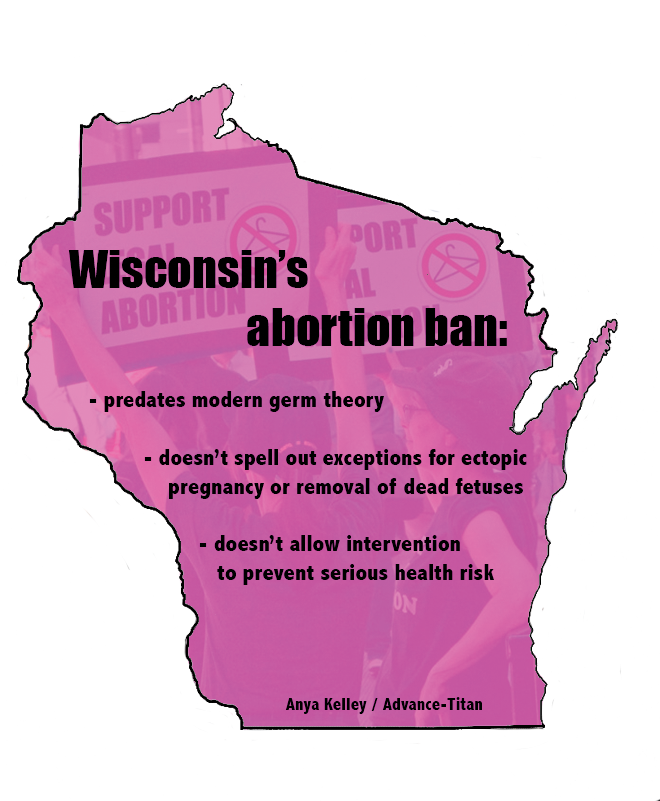Abortion ban exceptions controversial
UWO Democrats remain unimpressed by GOP proposal
May 3, 2023
The Wisconsin Republican party proposed an exception to the state abortion ban just three weeks before the monumental state Supreme Court election.
When Roe vs. Wade was overturned, Wisconsin’s abortion law defaulted to the 1849 abortion ban that makes abortion a felony for anyone, other than the pregnant person, to provide an abortion.
Under this law, almost all abortion would be considered a class H felony: up to six years in prison and up to a $10,000 fine.
Wisconsin law defines abortion as an act that “intentionally destroys the life of an unborn child.”
This differs from many state heartbeat laws because in Wisconsin, an unborn child is defined as “a human being from time of conception until it is born alive.”
Though the Wisconsin abortion ban does not outlaw self-managed abortions, abortion pills are currently not available in the state.
“The exception that Republicans are currently trying to add to the law is that for women who have been raped and incest up to 12 weeks,” said Eliza Farrow, the diversity, equity and inclusivity student services coordinator for the UW Oshkosh Women’s Center.
Farrow emphasized that after 12 weeks, no matter what the circumstances, the ban would be back in place.
“There is a thing in place that protects the life of the mother, but it’s all not very clear,” said Farrow. “So that’s the only exception so far in Wisconsin.”
Farrow said there is a lot of misinformation circulating about the abortion issue. Debates are taking place between both parties concerning what exactly it means to protect the life of the mother.
“Some Republicans have said that, for instance, ectopic pregnancy (pregnancy in which the fetus would not be viable and would be outside of the uterus – a life threatening condition) is not life threatening and that could be a potentially viable fetus that [the mother] would have to carry to term,” Farrow said. “People debate even things that medical professionals have said like, ‘hey, that’s literally not gonna work.’”
Farrow said that the rules of the new exception are not only vague but limiting. One in every six American women become victims of rape or attempted rape in their lifetimes. However, only 310 out of every 1,000 sexual assaults get reported meaning over two in every three go unreported.
“It’s hard to have enough evidence that police or lawyers will actually even take it to court,” Farrow said. “The ability to show burden of proof tends to be so high that nothing happens and because of our legal system, a lot of times, folks just decide that it’s not worth reporting it and being retraumatized.”
Farrow explained that it is not clear in the bill how they would determine if somebody had actually been a victim of rape or incest.
“It could be really stringent as it has to go to court, the person has to be prosecuted,” Farrow said. “In that case it would be too late … because you said 12 weeks.”
Isabella Wishnie, the co-chair for the UWO College Democrats, said she is trying to keep a positive mindset when it comes to reproductive rights in Wisconsin.
“It does give me a little bit of hope, you know, coming from having a total abortion ban to now, there being these exceptions that, you know, some states don’t have,” Wishnie said. “In a perfect world, we wouldn’t need these exceptions — people would be able to just choose what they would want to do. But this does make me a little bit hopeful moving forward.”
Wishnie said she hopes this exception will help move the state of Wisconsin to an agreement about abortion rights, but she believes that is still a far way away.
“We are still very much a divided state,” Wishnie said.
Wishnie said she feels that the Wisconsin GOP is using this abortion ban exception as an attempt to cater to the left.
“It’s a way for them to still kind of have this control, and in a way, have their own ban like the total ban,” Wishnie said.
Kayla Weinberger, the vice president of the College Democrats, said she feels Wisconsin still has a long way to go.
“[The GOP] wanted to put an idea forward that shows they are willing to be reasonable,” Weinberger said. “The idea that this exception is their idea of being reasonable and actually listening to the people is really eye opening.”
Weinberger said some of the Republicans in Wisconsin don’t have a read on what a majority of Wisconsinites are asking for.
“It’s a step, but it’s definitely not enough,” Weinberger said, “which is why Gov. Evers vetoed it.”
Weinberger said she felt conflicted about the proposal of the ban exception.
“I never lie to get too much into conspiracies, but it definitely was interesting that [this] was brought up right before the election,” Weinberger said. “I’d heard from a lot of younger people our age that a lot of people had voted conservative in the past … were changing their voting preferences because that’s how much [reproductive rights] matters to people.”
Weinberger said she feels abortion has been a hot button issue since she first started becoming politically aware. She said growing up in Catholic school, abortion was a touchy subject.
“I definitely want there to be a middle ground [but], at the same time, I’ve noticed a lot of conservative politicians are utilizing what’s unknown and people’s fear to get support,” Weinberger said. “Nothing motivates people more than fear unfortunately.”
Weinberger said she has begun questioning the GOP’s thought process.
“Another reason a lot of Democratic Wisconsin politicians were not in favor of this bill … is because it only adds on to the 1849 bill,” Weinberger said. “Don’t you think it’s time for us to just make something entirely new?”
The president of the College Republicans was contacted for comment and did not reply to the request.















